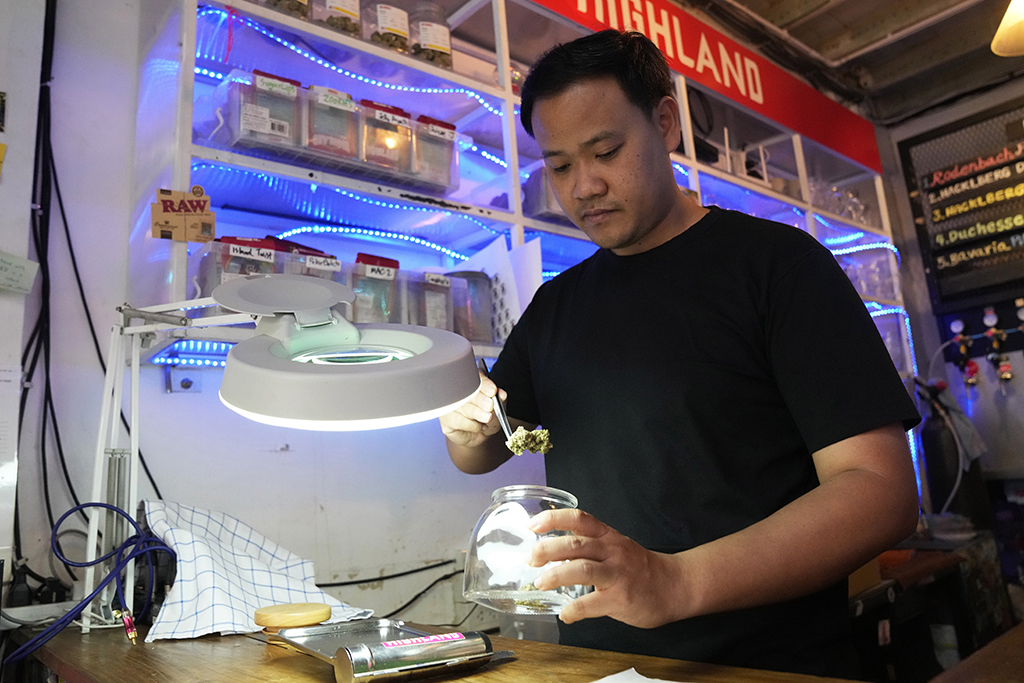by JINTAMAS SAKSORNCHAI
Associated Press
BANGKOK (AP) — Two years after Thailand made pot legal, the country appears set to crack down on its freewheeling drug market with a ban on “recreational” use.
Legal cannabis has fueled Thailand’s tourism and farming trades and spawned thousands of neon green shops, but it’s facing public backlash over perceptions that under-regulation has made the drug available to kids and caused crime.
The Health Minister Chonlanan Srikaew said last week that he had recommended a draft bill to the Cabinet that would ban recreational cannabis use while allowing medical. The Cabinet is expected to approve sending that to Parliament soon, but has not yet taken it up as of its most recent meeting on Tuesday.
A draft version of the law that was circulated for public comment in January would make using cannabis “for entertainment or pleasure” a crime punishable by a 60,000 baht (about $1,700) fine. It would allow medical marijuana, but didn’t give details of how it would be controlled.
Thailand was the first country in Asia to legalize cannabis. Decriminalization was spearheaded by the Bhumjaithai Party, which made it a major part of its platform in the 2019 general election campaign. The party’s stronghold is in the poor Northeast, where it promised farmers cannabis would be a new cash crop.
Party leader Anutin Charnvirakul became health minister and an important member of the military-led coalition, pushing through a 2022 amendment to the Narcotics Law that dropped cannabis from the list of controlled drugs.
Anutin had promised that cannabis would be allowed only for medical use, but in practice the market was nearly unregulated.
The Health Ministry issued regulations that made cannabis a “controlled herb” that requires a license for planting or selling, as well as banning online sales, sales to pregnant women and people under 20, and public smoking. But cannabis can be purchased easily by practically anyone at many unlicensed establishments or online.
Thai media was quickly filled with reports of drug-fueled violence and abuse, including among young people, who were not supposed to have access to the drug.
The Health Ministry reported a spike in people seeking treatment for cannabis-related psychological issues, from more than 37,000 patients in fiscal year 2022 to more than 63,000 patients in 2023. Other studies pointed to more young people using the drug.
In the 2023 election campaign, all major parties—including Bhumjaithai—promised to limit cannabis to medical use.
Kalyapat Rachitroj, a lawmaker from the opposition Move Forward Party who has a medical degree, said the plant has economic benefits, and has uses in health care to relieve pain and for terminally ill patients. But, she said, widespread recreational cannabis has created social problems such as youth drug abuse.
Given the current situation, “we have no option but to put marijuana back to be classified as narcotics once again.”
Cannabis advocates and entrepreneurs oppose a radical rollback.
Chokwan “Kitty” Chopaka, a cannabis shop owner and activist in Bangkok, acknowledged problems involving cannabis use but said they are due to lax enforcement of existing regulations.
She said many officials still see cannabis as a dangerous narcotic. “Where we, on the other hand, see it as a plant. It’s an herb. It’s something that we have had traditionally for a very long time.”
Rattapon Sanrak, the founder of Thailand’s first legal cannabis shop, said it would be an overreaction to put cannabis back on the narcotics list.
He also said the move would be impractical or even impossible, given how big the industry has grown.

Founder of Highland cafe Rattapon Sanrak prepares flower bud of marijuana for customers at his shop in Bangkok, Thailand. (AP Photo/Sakchai Lalit)
“I don’t think there’s anyone who disagrees with the control of use for underage children. No one wants to see people puffing weed on the street,” he said. “Sellers … also don’t want to see those street vendors who sell without a license.”
He called for more discussion on the best way to control the drug.
“People who don’t like it, people who are users, people who operate businesses, I think these parties have to find a common ground on how to exist together.”



